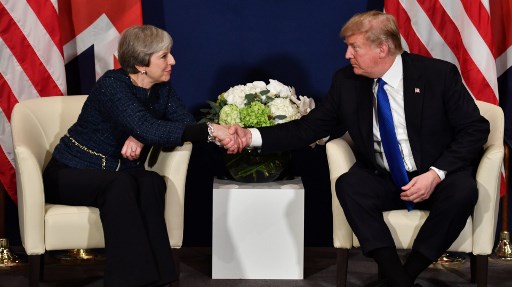
LONDON, United Kingdom (AFP) – Britain’s House of Lords begins scrutiny Tuesday of a key piece of Brexit legislation, as a leaked government report said Britain would be worse off whatever deal it strikes with the EU.
Almost 200 peers have requested to speak during the two-day debate on the EU (Withdrawal) Bill, many of them likely to be critical of its provisions to smooth Britain’s exit from the European Union, threatening another headache for Prime Minister Theresa May as she battles criticism from her own party.
The bill would repeal the 1972 act that made Britain a member of the bloc and transfer four decades of EU regulations onto the British statute books.
May’s government suffered one defeat when the bill went through the elected lower House of Commons late last year, after MPs demanded a vote on the final exit deal struck with Brussels.
Peers in the unelected upper House of Lords are threatening further amendments, including on new powers for ministers to amend the EU laws as they are moved across, which a Lords committee said were “wholly unacceptable”.
The main opposition Labour Party and the pro-EU Liberal Democrats will also seek to reject the government’s attempt to enshrine Brexit day in the bill.
Britain is due to leave on March 29, 2019, but the opposition argue the government may need some flexibility if the negotiations with Brussels on a departure deal run over.
May’s Conservative Party commands a slim majority in the House of Commons thanks to the support of a small Northern Irish party, but is outnumbered in the Lords.
Labour spokeswoman Baroness Dianne Hayter said this week’s debate would give “clear indications… of the strength of feeling within the house that this bill is not fit for purpose”.
The Liberal Democrats, who have only a handful of MPs but a strong presence in the Lords, said they would also push for an amendment on a second referendum on any final Brexit deal.
Their leader in the chamber, Lord Dick Newby, said that 90 percent of the peers seeking to speak in the debate opposed the bill on legal, constitutional or political grounds.
“It’s going to be very heart-pounding for the government,” he said.
No votes are expected on the withdrawal bill until April, after weeks of detailed scrutiny by peers, but the early days of debate will make clear where the battles lie.
‘In EU in all but name’
Negotiations between Britain and the EU are due to start again in March, but an economic impact assessment, drawn up for the Brexit ministry by various government departments and seen by the BuzzFeed News website, predicted that growth would be lower, whatever the final deal.
The January 2018 study, titled “EU Exit Analysis”, examined three of the most plausible Brexit scenarios and estimated that growth would be between two percent and eight percent lower over the next 15 years.
Responding to the leak, a government source said the report was an “early draft” that “contains a significant number of caveats.”
Conservative MPs have meanwhile been rounding on May’s record and strategy for Brexit, prompting reports of fresh moves against her.
The prime minister has been plagued by rumours of leadership challenges since she called a snap election last year only to lose her party’s majority in the Commons.
The latest splits come amid growing concern among Conservative eurosceptics about plans for a post-Brexit transition period, for which the EU published its guidelines on Monday.
They set out how Britain would have to accept all the bloc’s rules in return for continued access to the single market — but with no say in making policy.
One MP has warned this would make Britain a “vassal state”, while others are concerned about the future trading relationship.
Trade Secretary Liam Fox, who campaigned for Brexit, on Tuesday told the Sun newspaper that eurosceptics must “live with disappointment” and accept that Britain could maintain close ties with the EU.
Pro-Brexit campaigner and former minister Theresa Villiers said Britain appeared to be heading for a “dilution of Brexit”, with a deal that would “keep us in the EU in all but name”. (Agence France-Presse)








